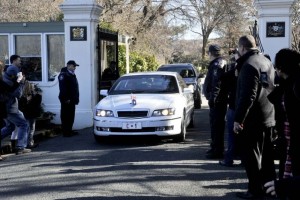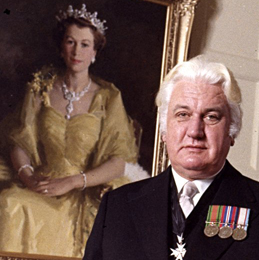THERE is something demeaning about the ride in the big white car ride to the Governor-General’s residence in Yarralumla – not just for defeated Prime Ministers, but also new ones.  Australian Prime Ministers, though indirectly elected by the people, must be appointed by the Governor-General who in turn is the appointed representative of the monarch who holds office by hereditary or divine right. Continue reading “The demeaning trip to Yarralumla”
Australian Prime Ministers, though indirectly elected by the people, must be appointed by the Governor-General who in turn is the appointed representative of the monarch who holds office by hereditary or divine right. Continue reading “The demeaning trip to Yarralumla”
Month: June 2013
2 + 2 does not equal 4 and business becomes impossible
TWO plus two does not equal four. A rise in global temperatures of four-degrees is not just twice as bad as a rise of two-degrees. The effect is exponential. “Business in a four-degree world is not possible,” Ian Dunlop told a gathering in Canberra this week. Continue reading “2 + 2 does not equal 4 and business becomes impossible”
Freedom a long time coming
TODAY (Saturday 15 June 2013) is the 798th anniversary of the signing of the Magna Carta. Of course, the big fuss will be on the 800th anniversary, but as a typical journalist, I though I’d get in early.  Magna Carta’s significance is that for the first time a ruler was declared to be subject to the law.
Magna Carta’s significance is that for the first time a ruler was declared to be subject to the law.
It also provided that the ruler could not raise taxes without permission of the barons, or later Parliament, and that no freeman could be imprisoned or have his property seized without judgment of his peers. It was the original habeas corpus. Too bad if you were a serf, however.
It provided also that if the King breached the provisions, the king could be removed.
It was a breakthrough. Hitherto in human history the ruler, emperor, pharaoh or whatever you called the ruler, ruled absolutely usually invoking god as the source of power.
Even in ancient Greece and Rome, the powers of the rulers (Caesar and before that the consuls in the republic) were not so constrained.
For the first time the ruler had to accept that his power was not arbitrary. And it was HIS power. Queen Matilda – the sole survivor and daughter of Henry I – ruled very briefly in 1141 but was never crowned because the misogynist male barons refused to accept the legitimacy of her rule. She was a sort of early-day Julia Gillard, if you like.
Magna Carta was a great start. It did not give the freedoms to everyone. The peasants only got more freedom after the Peasants’ Revolt of 1381. That stemmed from the Black Death killing so many people that a labour shortage ensued which peasants wanted to exploit by moving about, but this was resisted by the lords to whom they were tenured.
Magna Carta was resisted by subsequent monarchs and it was not until 1688 that Parliament became ultimately supreme and executive power was finally put firmly under the rule of law. That concept lies at the heart of our liberal democracies.
We still have fights about liberty – indefinite detention of asylum seekers and prisoners who have served their full terms are recent examples.
But my point here is that the ethos of liberal democracy which you find in places like Britain, Australia, the United States, Canada, New Zealand and parts of Europe go back a very long way – 798 years today.
We should have taken much greater note of this before we went into Afghanistan and Iraq.
The idea that the US and its allies can march into a country, topple a dictator, order elections and imagine for a moment that liberal democracy will thrive defies history. It is plain stupid.
Liberal democracy has had a difficult enough time in the few places it is seemingly entrenched. Remember, Richard Nixon told David Frost in 1977, “Well, when the president does it, that means that it is not illegal.”
And in Australia, Malcolm Fraser engineered the ousting of a democratically elected government.
In most post-colonial states in Africa and Asia, liberal democracy gets short shrift. The strongman (or woman in the case of India) does everything to stay in power, irrespective of popular will.
It has taken nearly 50 years for some African nations like Ghana and Botswana to tread the democratic road, and the trip is still hazardous.
Throughout recent history, invaders who come in the name of liberation are usually resisted. Napoleon and Hitler imagined the downtrodden Russians would thank them. Instead they fought for the Czar and Stalin.
George W. Bush naively thought that Iraqis would see the US as liberators.
People will not fight for personal freedom. They will fight for national freedom against foreigners. And they will fight for their religious beliefs.
Liberal democracy is not a universal yearning of humankind.
Civilisation – writing, government, agriculture – has been around for 10,000 years. In that time liberal democracy has been but a small episode in a general drama of oppression and religious war.
We should remember that next time before we follow the US into some imperial foray in the name of democracy and freedom. Those forays never do the cause of freedom any good.
DOT DOT DOT
Speaking of freedom, Google is in strife again. Brisbane man Jarrod Sierocki has begun action in Queensland seeking $2.6 million in defamation damages and a court order for Google to remove search results that link him to a website which defame him.
At time of writing the Google search for his name put a “Rip-off Report” above Sierocki’s own website which urges readers to read his explanations first.
Google argues that it is not the publisher. Sierocki’s argument is that the search result is a publication in itself and the fact that the negative one comes first makes it defamatory.
If that argument gets up, it will be for Google to prove the truth of the allegations in the Rip-off Report. A casual glance at those allegations would suggest that the task will be very difficult and costly at least, and impossible at worst.
Lawyers tend to advise plaintiffs to go for the defendant with the deepest pocket – in this case Google, not the Rip-off Report.
Google will be left to argue that it is doing no more than the newspaper truck which delivers defamatory material to a newsagent. It will make use of the defence of innocent dissemination under the uniform defamation code. The trouble is, Google’s software determines the order in which the articles appear.
If Sierocki wins against Google, it will make the task of search-engine companies quite hazardous.
Last year, the Victorian Supreme Court ordered Google to pay a Melbourne man $200,000 because the search engine threw up his picture in image searches about Melbourne’s Most Wanted, simply because the poor chap was an innocent bystander who got hit in a gangland shoot-out in a restaurant.
I have every sympathy for these plaintiffs, but this is not just a case of balancing reputation against freedom speech, but reputation against the enormous social utility of search engines like Google.
CRISPIN HULL
The article first appeared in The Canberra Times on 15 June 2013.
God saves one but not the other
“WELL may we say ‘God save the Queen’ for nothing will save the Governor-General.”
These words, spoken by just-sacked Prime Minister Gough Whitlam in 1975 and broadcast again earlier this week in the ABC’s mini-series on Whitlam, carry some hidden truths – truths worth looking at in the same week that Treasurer Wayne Swan and Opposition frontbencher Malcolm Turnbull raised again the question of Australia becoming a republic. Continue reading “God saves one but not the other”
Change the rules — open the revenue flood Gates
IT WAS a refreshing invitation. Microsoft founder Bill Gates said that if governments wanted to tax multi-nationals more, they should “change the rules” and do so. But that is easier said than done. And when you look at corporate tax over the past decade you see just what a hard time Labor has had compared to the easy run that the Howard Government had. But more of that anon. Continue reading “Change the rules — open the revenue flood Gates”